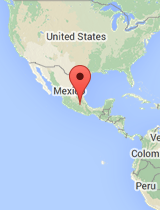Medical Summary
The health risk information presented here is summarized from Shoreland Travax®, a decision-support tool used by health care providers to perform a detailed health risk analysis based on specific locations, individual travel styles, and traveler risk behaviors. Travax provides practitioners current, independently researched malaria risk and prevention recommendations in a map-based format that goes beyond the annual WHO and US CDC statements included here. Not included here are current reports from Travax of disease outbreaks or environmental events that may pose elevated risks to travelers’ health and safety. The Providers section of this site offers a directory of health care providers who utilize Shoreland Travax for travel health counseling. Learn more about the detailed reports and maps available from these practitioners (includes links to samples).
General Information
Mexico is a developing nation classified as upper middle income. Located in North America (south of the US and north of Guatemala), the climate is extremely diverse with classifications that range from humid equatorial (no dry season) to arid (dry), with cooler temperatures in some high-altitude areas.
Vaccinations
Routine vaccinations are essential due to a persistent global rise of vaccine-preventable diseases (especially markedly high rates of diphtheria, pertussis, and measles). Prior to travel, travelers should be up-to-date with the age-appropriate and risk-based routine vaccinations recommended by their home country, which may include:
- COVID-19
- H. influenzae type B (Hib)
- Hepatitis A
- Hepatitis B: Protection is especially important for those at increased risk.
- Herpes zoster
- Human papillomavirus
- Influenza
- Measles, mumps, rubella: A single early dose is recommended for travelers aged 6-11 months.
- Meningococcal
- Pneumococcal
- Polio
- Rotavirus
- Tetanus, diphtheria, pertussis: Tdap preferred; consider an early pertussis booster for high-risk travelers.
- Varicella
Depending on your itinerary, your personal risk factors, and the length of your visit, your health care provider may offer you vaccination against chikungunya, dengue, mpox, rabies, or typhoid fever.
Malaria
See also: Library article for Malaria
The following is current information as reported by the World Health Organization (WHO) and the US Centers for Disease Control (CDC):
WHO—International Travel and Health (current online update, Country List)
(2022) Malaria risk due almost exclusively to P. vivax exists intermittently throughout the year in some rural areas that are not often visited by tourists. These areas are located in the states of Campeche, Chiapas, Chihuahua, and Sinaloa.- Recommended prevention in moderate risk areas: A – Very limited risk of malaria transmission. Mosquito bite prevention only.
WHO Country List footnote: When available, the date of the most recent update or confirmation is indicated in parentheses in the country list. If no accurate date is indicated, the most recent update or confirmation was provided prior to 2013.
CDC—Health Information for International Travel (current online edition)
Transmission areas
- Campeche, Chiapas, and the southern part of Chihuahua state
- Rare in the states of Oaxaca, Sinaloa, Sonora, and Tabasco
- No malaria transmission along the US–Mexico border
Drug resistance1
- None
Species
- P. vivax (100%)
Recommended chemoprophylaxis
- Campeche, Chiapas, and the southern part of Chihuahua state: Atovaquone-proguanil, chloroquine, doxycycline, mefloquine, primaquine5, tafenoquine2
- All other areas with malaria transmission: No chemoprophylaxis recommended (insect bite precautions and mosquito avoidance only)4
1 Refers to P. falciparum malaria, unless otherwise noted.
2 Tafenoquine can cause potentially life-threatening hemolysis in people with glucose-6-phosphate-dehydrogenase (G6PD) deficiency. Test for G6PD deficiency with a quantitative laboratory test before prescribing tafenoquine to patients.
4 Mosquito avoidance includes applying topical mosquito repellant, sleeping under an insecticide-treated mosquito net, and wearing protective clothing (e.g., long pants and socks, long-sleeve shirt). For additional details on insect bite precautions, see Mosquitoes, Ticks, and Other Arthropods chapter.
5 Primaquine can cause potentially life-threatening hemolysis in people with G6PD deficiency. Test for G6PD deficiency with a quantitative laboratory test before prescribing primaquine to patients.
Other Concerns
Travelers' Diarrhea
See also: Library article for Travelers' Diarrhea
High risk exists throughout the country, including in deluxe accommodations. Community sanitation and food safety measures are generally inadequate. Some itineraries (e.g., remote destinations, austere accommodations) and activities (e.g., ecotourism, eating street or local-market food) further increase risk.
Travelers should observe food and beverage precautions, which reduce the likelihood of illness.
Travelers should carry loperamide for self-treatment of diarrhea and, if risk is moderate to high, an antibiotic to add if diarrhea is severe. Consult a knowledgeable health care provider regarding which antibiotic is appropriate for you and most effective for your destination.
Other Food-Borne Illnesses
Precautions to prevent brucellosis, seafood poisoning may be needed.
Insect- and Arthropod-Borne Diseases
Chagas' disease (American trypanosomiasis), leishmaniasis, Lyme disease, mayaro virus, Rocky Mountain spotted fever, West Nile virus, Zika may pose a risk. Personal protective measures are important.
Other Disease and Health Risks
Additional concerns include air pollution, anthrax disease, avian influenza, helminths, leptospirosis, marine hazards, melioidosis, New World screwworm (myiasis), plague, sexually transmitted infections, snakebites, tuberculosis.
Safety and Security
See also: Library article for Safety and Security
Key Safety Risks
- Road conditions and traffic collisions
- Public transportation
- Maritime safety
- Petty crime
- Heightened crime risk for women
- Food and beverage spiking
- Theft of vehicles
- Scams
- Natural disasters
Key Security Threats
- Risk of violent civil unrest
- Risk of violent protests
- Violent crime
- Kidnapping
- Random acts of armed violence
Emergency Contacts
The national emergency number is 911.

